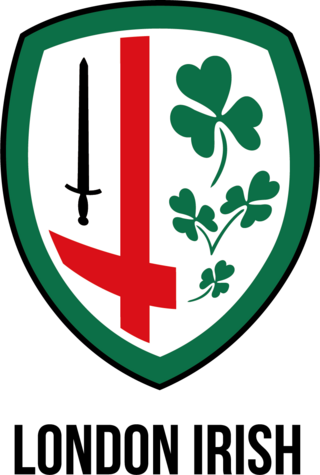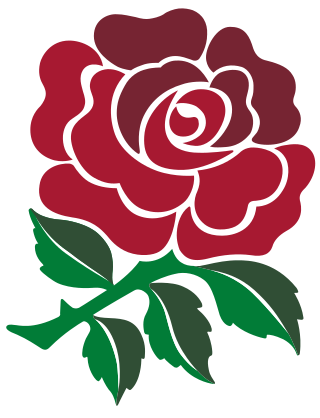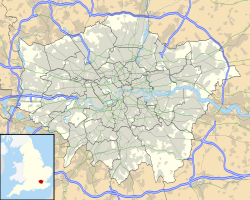
London Irish RFC is a professional rugby union club which competes in the Premiership, the top division of English rugby union. The club has also competed in the Anglo-Welsh Cup, the European Champions Cup and European Challenge Cup. While playing in the Championship in 2016–17 and 2018–19, it also played in the British and Irish Cup and RFU Championship Cup. The club played home games at the Madejski Stadium in Reading, Berkshire for twenty years, before moving for the 2020–21 season to the Gtech Community Stadium in Brentford, West London.

Lorenzo Bruno Nero Dallaglio, known as Lawrence Dallaglio, is an English retired rugby union player, former captain of England, and 2016 inductee of the World Rugby Hall of Fame.

The England men’s national rugby union team represents England in men's international rugby union. They compete in the annual Six Nations Championship with France, Ireland, Italy, Scotland and Wales. England have won the championship on 29 occasions, winning the Grand Slam 14 times and the Triple Crown 26 times, making them the most successful outright winners in the tournament's history. They are currently the only team from the Northern Hemisphere to win the Rugby World Cup, having won the tournament in 2003, and have been runners-up on three other occasions.

The Rugby Football Union (RFU) is the national governing body for rugby union in England. It was founded in 1871, and was the sport's international governing body prior to the formation of what is now known as World Rugby (WR) in 1886. It promotes and runs the sport, organises international matches for the England national team, and educates and trains players and officials.

Twickenham Stadium in Twickenham, south-west London, England, is a rugby union stadium owned by the Rugby Football Union (RFU), English rugby union governing body, which has its headquarters there. The England national rugby union team plays home matches at the stadium.
Rugby union in Cornwall is Cornwall's most popular spectator sport with a large following. The followers of the national side are dubbed Trelawny's Army. In 1991 and 1999 Cornwall won the County Championship final played at Twickenham Stadium, beating Yorkshire and Gloucestershire respectively to win the Cup. They had another strong spell in the 2010s, reaching seven of the eight finals contested between 2013 and 2022, winning four of them.

Twickenham Stoop Stadium is a sports stadium located in south-west London, England. The stadium is home to Harlequins rugby union team, who play in the Gallagher Premiership. The stadium has a capacity of 14,800 and is situated just across the road from Twickenham Stadium.
The Scottish Football Museum is Scotland’s national museum of association football, located in Hampden Park in Glasgow.

Rugby union in England is one of the leading professional and recreational team sports. In 1871 the Rugby Football Union, the governing body for rugby union in England, was formed by 21 rugby clubs, and the first international match, which involved England, was played in Scotland. The England national team compete annually in the Six Nations Championship, and are former world champions after winning the 2003 Rugby World Cup. The top domestic men's club competition is Premiership Rugby, and English clubs also compete in international competitions such as the European Rugby Champions Cup. The top domestic women's competition is the Premier 15s.

Women's rugby union is a full contact team sport based on running with the ball in hand. The same laws are used in men's rugby union with the same sized pitch and same equipment. Rugby was originally a men's sport, and women's rugby has become popular only more recently. These days, women's rugby is gaining a higher profile thanks to international tournaments' exposure and financial investment.
The rivalry between the England and Australia national rugby union teams started on 9 January 1909 at Blackheath's Rectory Field in England, during the 1908–09 Australia rugby union tour of Britain, dubbed the 1st Wallabies. The Wallabies won the match 9–3. The two nations next met in 1928, at Twickenham, during the 1927–28 Waratahs tour of the British Isles, France and Canada and England won 18–11. After the 1939–40 Australia rugby union tour of Britain and Ireland was cancelled due to the outbreak of World War II, twenty years passed before England and Australia next met, again at Twickenham, with Australia winning the 1948 test 11–0. It would then be another decade until the two nations played another test against one another. In 1958, they met again at Twickenham, and England won 9–6.

The Rugby Football Union for Women (RFUW) was the governing body for women's rugby union in England. In 2014 the RFUW and Rugby Football Union (RFU) combined to be one national governing body. The headquarters are at Twickenham Stadium, London.
The Harry Langton Collection includes cultural and sporting items relating to the history of football and forms the core of both the National Football Museum in Manchester, England and the World Rugby Museum, housed in the South Stand of Twickenham Stadium.
Rugby union is one of the most popular sports, in terms of both participants and spectators in London. London has several of England's leading rugby union clubs, and the city is home to 13 teams playing in national leagues, and many regional amateur leagues regulated by the London and South East Division Rugby Football Union. However, several of these teams, due to necessity, have found homes at stadia outside the boundaries of the capital. The sport is well established, especially in the middle-class suburbs to the north and west of the city. Four of the twelve clubs currently in the Gallagher Premiership have London origins.

John Paul "JP" Doyle is an Irish rugby union referee. Doyle was one of ten full-time rugby union referees employed by the English Rugby Football Union until his redundancy in August 2020. In 2021, he was a referee in Major League Rugby (MLR) in the United States. In 2022, he was named high performance referee coach by Scottish Rugby Union.
The Kent Rugby Football Union is the governing body for the sport of rugby union in the county of Kent in England. The union is the constituent body of the Rugby Football Union (RFU) for Kent, and administers and organises rugby union clubs and competitions in the county. It also administers the Kent county rugby representative teams.
The Oxfordshire Rugby Football Union is the governing body for the sport of rugby union in the county of Oxfordshire in England. The union is the constituent body of the Rugby Football Union (RFU) for Oxfordshire, and administers and organises rugby union clubs and competitions in the county. It also administers the Oxfordshire county rugby representative teams.
The RFU Intermediate Cup is a rugby union national knockout cup competition in England run by the Rugby Football Union. It is contested by teams at level 7 of the English rugby union system. While the competition is a national one, it is however split into regions until the semi-finals with the final being held at Twickenham Stadium in London. It was first contested in 1997. Presently, the RFU Intermediate Cup is the third most important club cup competition in England, behind the Premiership Rugby Cup and RFU Championship Cup.
The RFU Senior Vase is a rugby union national knockout cup competition in England run by the Rugby Football Union, which has been competed for since the 2006–07 season. It is contested for by teams at level 8 of the English rugby union system, with only 1st XV sides being allowed to enter. The competition is a national one but is split into regions until the semi-finals with the final being held at Twickenham Stadium in London. As of 2018-19 it is the fourth most prestigious national club cup competition in England behind the Premiership Rugby Cup, RFU Championship Cup and RFU Intermediate Cup.
The RFU Junior Vase is a rugby union national knockout cup competition in England run by the Rugby Football Union, which has been competed for since 1990. It is mostly contested by 1st XV teams at level 9 of the English rugby union system, although sides as low as level 12 or even outside the league system can sometimes enter. The competition is a national one, but split into regions until the national semi-finals with the final being held at Twickenham Stadium in London. Presently, the RFU Junior Vase is the fifth most important club cup competition in England, behind the Premiership Rugby Cup, RFU Championship Cup, RFU Intermediate Cup and RFU Senior Vase.















